Analyzing Behavioral Finance and Its Impact on Investing
VerifiedAdded on 2022/08/21
|6
|1193
|24
Report
AI Summary
This report provides a comprehensive overview of behavioral finance and its influence on investment decisions. It highlights the contrast between behavioral finance and the efficient market hypothesis, attributing market inefficiencies to investors' non-rational behaviors. The report delves into the role of emotions, anchoring bias, and overconfidence in shaping investor choices, drawing on research by Kilger, van den Assem, and Zwinkels, among others. It also explores the impact of social finance and networks on financial information flow, and the potential for behavioral finance to evolve into a more comprehensive field that incorporates social and psychological factors to provide a more in-depth understanding of financial markets. The conclusion emphasizes the importance of behavioral finance as a tool for both individual investors and financial advisors to navigate the complexities of the financial world. The report also references key research papers and the development of behavioral finance over the past 50 years.
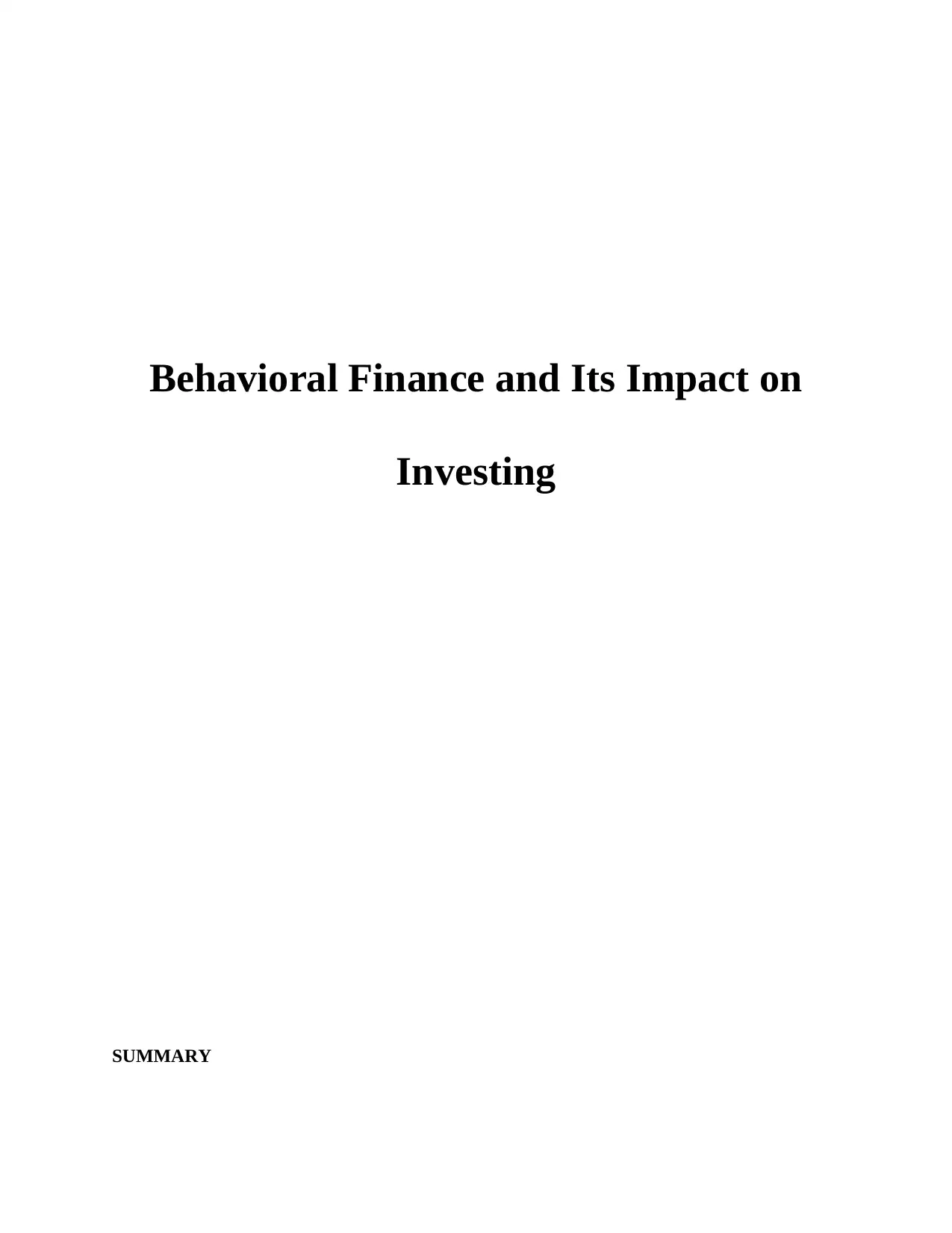
Behavioral Finance and Its Impact on
Investing
SUMMARY
Investing
SUMMARY
Paraphrase This Document
Need a fresh take? Get an instant paraphrase of this document with our AI Paraphraser
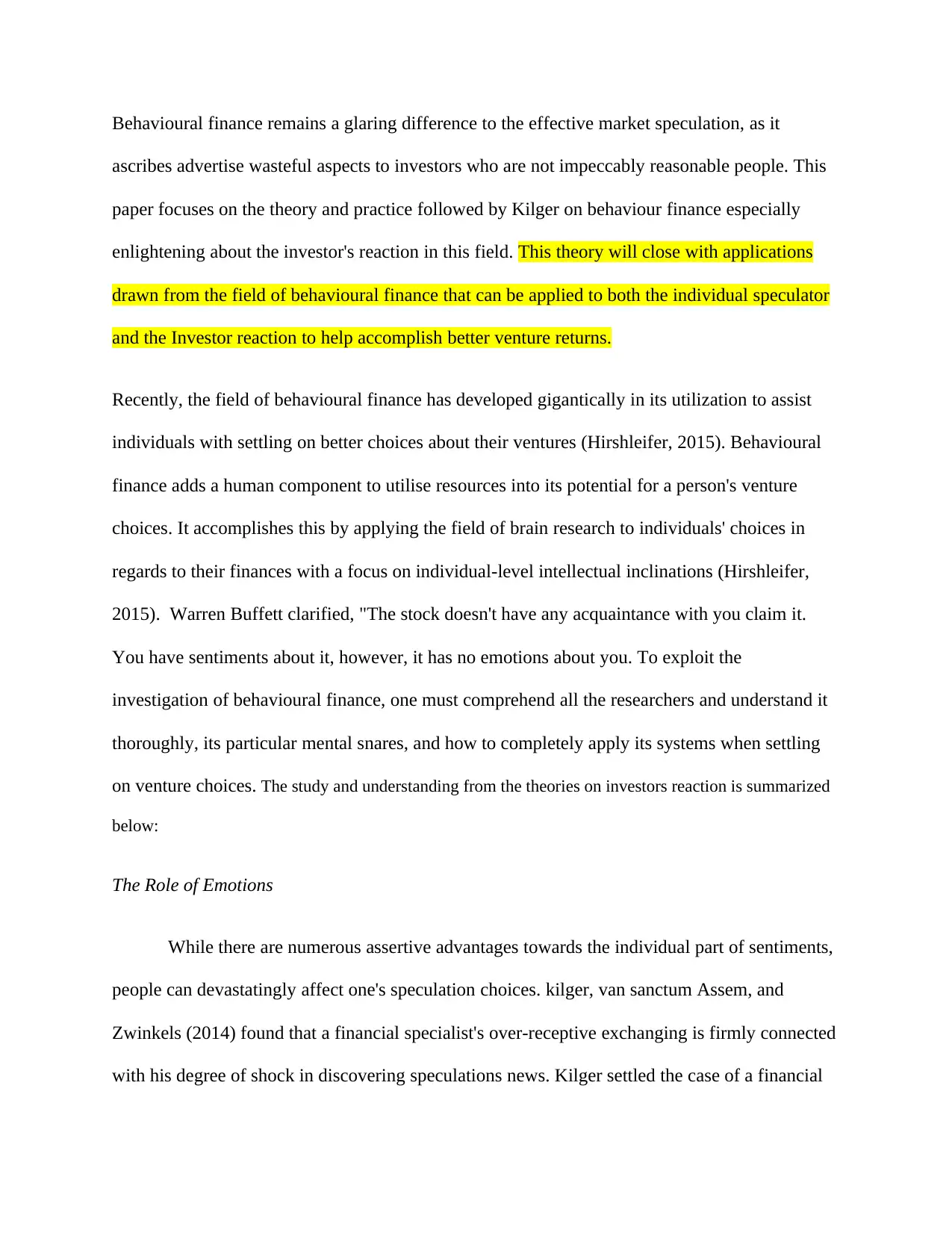
Behavioural finance remains a glaring difference to the effective market speculation, as it
ascribes advertise wasteful aspects to investors who are not impeccably reasonable people. This
paper focuses on the theory and practice followed by Kilger on behaviour finance especially
enlightening about the investor's reaction in this field. This theory will close with applications
drawn from the field of behavioural finance that can be applied to both the individual speculator
and the Investor reaction to help accomplish better venture returns.
Recently, the field of behavioural finance has developed gigantically in its utilization to assist
individuals with settling on better choices about their ventures (Hirshleifer, 2015). Behavioural
finance adds a human component to utilise resources into its potential for a person's venture
choices. It accomplishes this by applying the field of brain research to individuals' choices in
regards to their finances with a focus on individual-level intellectual inclinations (Hirshleifer,
2015). Warren Buffett clarified, "The stock doesn't have any acquaintance with you claim it.
You have sentiments about it, however, it has no emotions about you. To exploit the
investigation of behavioural finance, one must comprehend all the researchers and understand it
thoroughly, its particular mental snares, and how to completely apply its systems when settling
on venture choices. The study and understanding from the theories on investors reaction is summarized
below:
The Role of Emotions
While there are numerous assertive advantages towards the individual part of sentiments,
people can devastatingly affect one's speculation choices. kilger, van sanctum Assem, and
Zwinkels (2014) found that a financial specialist's over-receptive exchanging is firmly connected
with his degree of shock in discovering speculations news. Kilger settled the case of a financial
ascribes advertise wasteful aspects to investors who are not impeccably reasonable people. This
paper focuses on the theory and practice followed by Kilger on behaviour finance especially
enlightening about the investor's reaction in this field. This theory will close with applications
drawn from the field of behavioural finance that can be applied to both the individual speculator
and the Investor reaction to help accomplish better venture returns.
Recently, the field of behavioural finance has developed gigantically in its utilization to assist
individuals with settling on better choices about their ventures (Hirshleifer, 2015). Behavioural
finance adds a human component to utilise resources into its potential for a person's venture
choices. It accomplishes this by applying the field of brain research to individuals' choices in
regards to their finances with a focus on individual-level intellectual inclinations (Hirshleifer,
2015). Warren Buffett clarified, "The stock doesn't have any acquaintance with you claim it.
You have sentiments about it, however, it has no emotions about you. To exploit the
investigation of behavioural finance, one must comprehend all the researchers and understand it
thoroughly, its particular mental snares, and how to completely apply its systems when settling
on venture choices. The study and understanding from the theories on investors reaction is summarized
below:
The Role of Emotions
While there are numerous assertive advantages towards the individual part of sentiments,
people can devastatingly affect one's speculation choices. kilger, van sanctum Assem, and
Zwinkels (2014) found that a financial specialist's over-receptive exchanging is firmly connected
with his degree of shock in discovering speculations news. Kilger settled the case of a financial
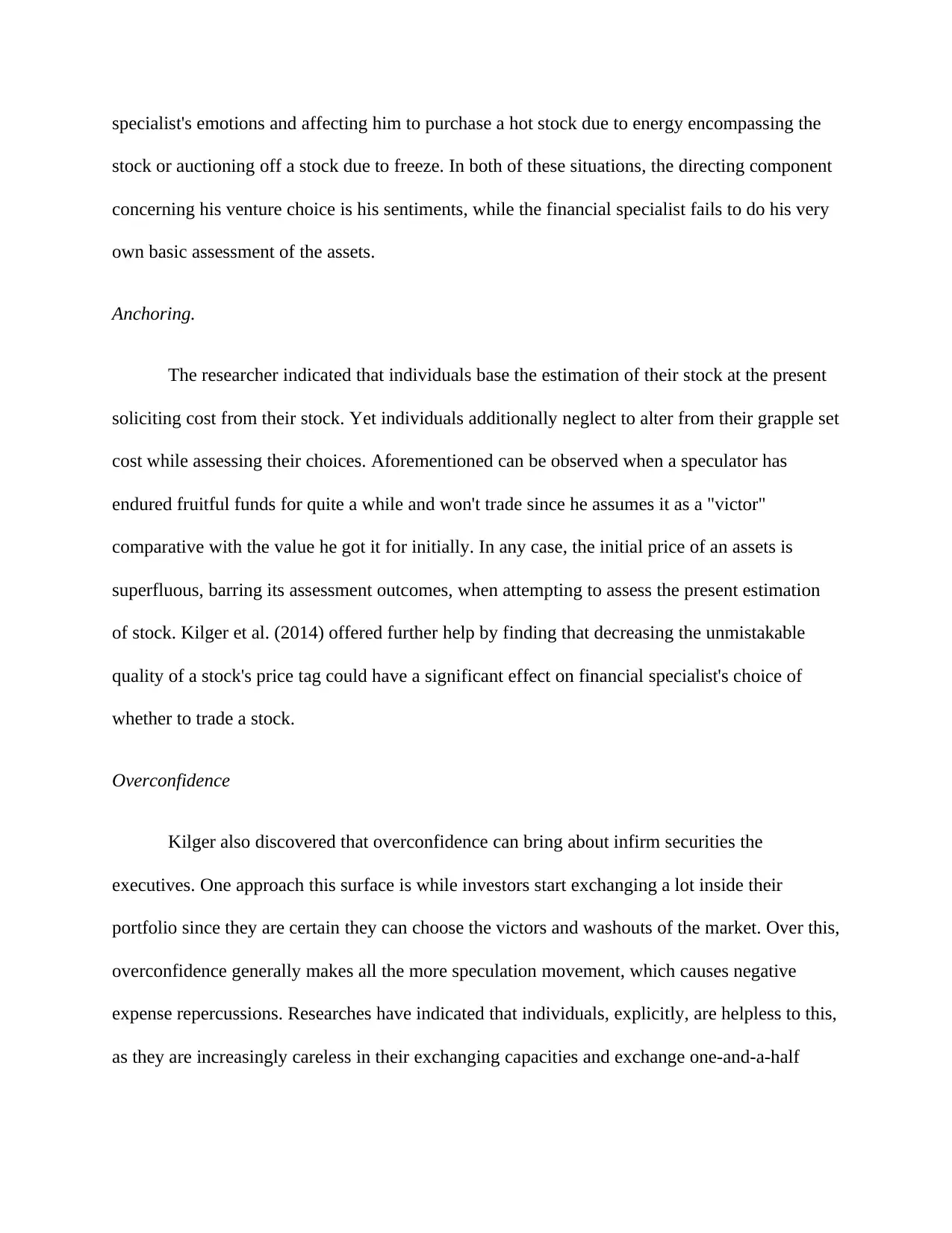
specialist's emotions and affecting him to purchase a hot stock due to energy encompassing the
stock or auctioning off a stock due to freeze. In both of these situations, the directing component
concerning his venture choice is his sentiments, while the financial specialist fails to do his very
own basic assessment of the assets.
Anchoring.
The researcher indicated that individuals base the estimation of their stock at the present
soliciting cost from their stock. Yet individuals additionally neglect to alter from their grapple set
cost while assessing their choices. Aforementioned can be observed when a speculator has
endured fruitful funds for quite a while and won't trade since he assumes it as a "victor"
comparative with the value he got it for initially. In any case, the initial price of an assets is
superfluous, barring its assessment outcomes, when attempting to assess the present estimation
of stock. Kilger et al. (2014) offered further help by finding that decreasing the unmistakable
quality of a stock's price tag could have a significant effect on financial specialist's choice of
whether to trade a stock.
Overconfidence
Kilger also discovered that overconfidence can bring about infirm securities the
executives. One approach this surface is while investors start exchanging a lot inside their
portfolio since they are certain they can choose the victors and washouts of the market. Over this,
overconfidence generally makes all the more speculation movement, which causes negative
expense repercussions. Researches have indicated that individuals, explicitly, are helpless to this,
as they are increasingly careless in their exchanging capacities and exchange one-and-a-half
stock or auctioning off a stock due to freeze. In both of these situations, the directing component
concerning his venture choice is his sentiments, while the financial specialist fails to do his very
own basic assessment of the assets.
Anchoring.
The researcher indicated that individuals base the estimation of their stock at the present
soliciting cost from their stock. Yet individuals additionally neglect to alter from their grapple set
cost while assessing their choices. Aforementioned can be observed when a speculator has
endured fruitful funds for quite a while and won't trade since he assumes it as a "victor"
comparative with the value he got it for initially. In any case, the initial price of an assets is
superfluous, barring its assessment outcomes, when attempting to assess the present estimation
of stock. Kilger et al. (2014) offered further help by finding that decreasing the unmistakable
quality of a stock's price tag could have a significant effect on financial specialist's choice of
whether to trade a stock.
Overconfidence
Kilger also discovered that overconfidence can bring about infirm securities the
executives. One approach this surface is while investors start exchanging a lot inside their
portfolio since they are certain they can choose the victors and washouts of the market. Over this,
overconfidence generally makes all the more speculation movement, which causes negative
expense repercussions. Researches have indicated that individuals, explicitly, are helpless to this,
as they are increasingly careless in their exchanging capacities and exchange one-and-a-half
⊘ This is a preview!⊘
Do you want full access?
Subscribe today to unlock all pages.

Trusted by 1+ million students worldwide
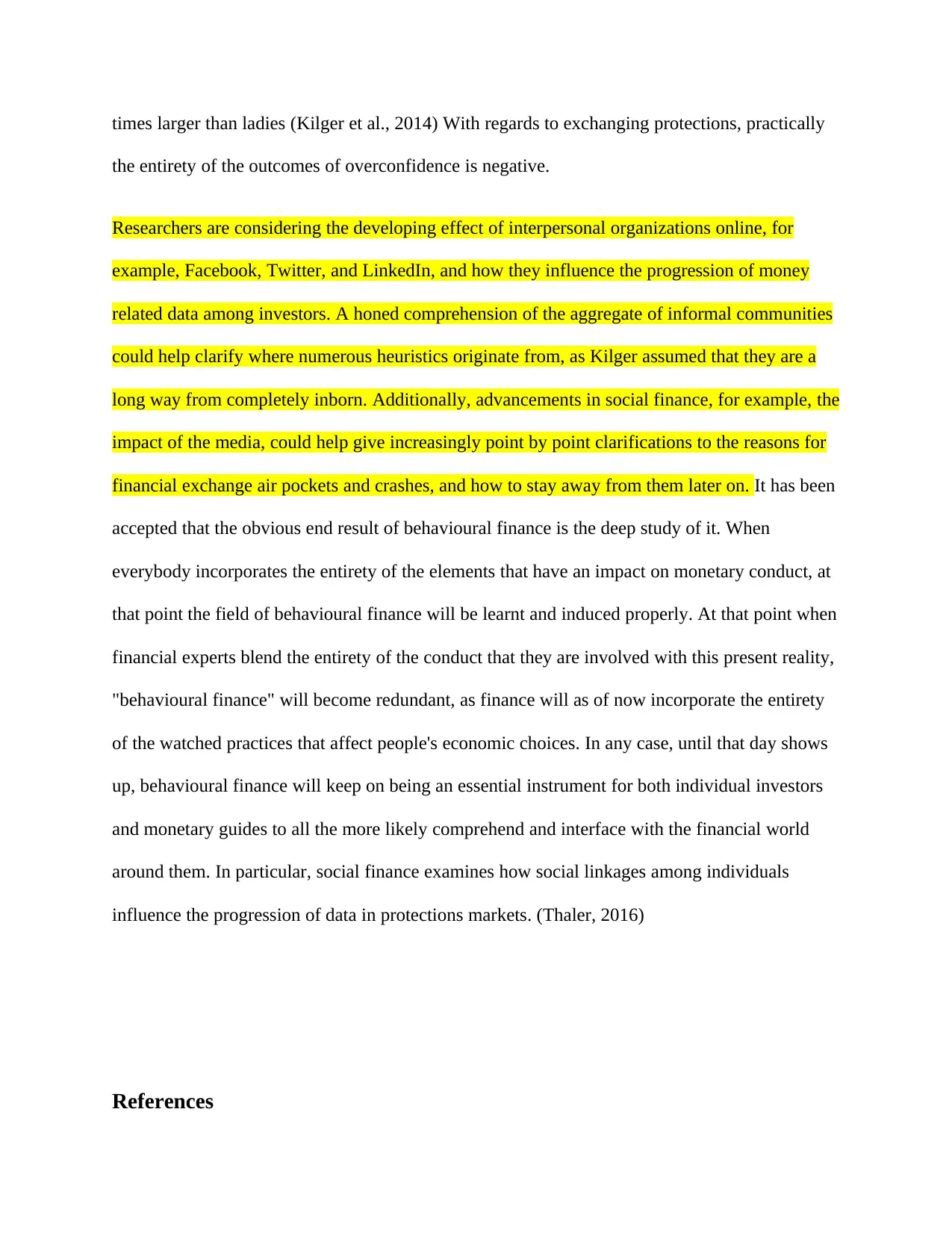
times larger than ladies (Kilger et al., 2014) With regards to exchanging protections, practically
the entirety of the outcomes of overconfidence is negative.
Researchers are considering the developing effect of interpersonal organizations online, for
example, Facebook, Twitter, and LinkedIn, and how they influence the progression of money
related data among investors. A honed comprehension of the aggregate of informal communities
could help clarify where numerous heuristics originate from, as Kilger assumed that they are a
long way from completely inborn. Additionally, advancements in social finance, for example, the
impact of the media, could help give increasingly point by point clarifications to the reasons for
financial exchange air pockets and crashes, and how to stay away from them later on. It has been
accepted that the obvious end result of behavioural finance is the deep study of it. When
everybody incorporates the entirety of the elements that have an impact on monetary conduct, at
that point the field of behavioural finance will be learnt and induced properly. At that point when
financial experts blend the entirety of the conduct that they are involved with this present reality,
"behavioural finance" will become redundant, as finance will as of now incorporate the entirety
of the watched practices that affect people's economic choices. In any case, until that day shows
up, behavioural finance will keep on being an essential instrument for both individual investors
and monetary guides to all the more likely comprehend and interface with the financial world
around them. In particular, social finance examines how social linkages among individuals
influence the progression of data in protections markets. (Thaler, 2016)
References
the entirety of the outcomes of overconfidence is negative.
Researchers are considering the developing effect of interpersonal organizations online, for
example, Facebook, Twitter, and LinkedIn, and how they influence the progression of money
related data among investors. A honed comprehension of the aggregate of informal communities
could help clarify where numerous heuristics originate from, as Kilger assumed that they are a
long way from completely inborn. Additionally, advancements in social finance, for example, the
impact of the media, could help give increasingly point by point clarifications to the reasons for
financial exchange air pockets and crashes, and how to stay away from them later on. It has been
accepted that the obvious end result of behavioural finance is the deep study of it. When
everybody incorporates the entirety of the elements that have an impact on monetary conduct, at
that point the field of behavioural finance will be learnt and induced properly. At that point when
financial experts blend the entirety of the conduct that they are involved with this present reality,
"behavioural finance" will become redundant, as finance will as of now incorporate the entirety
of the watched practices that affect people's economic choices. In any case, until that day shows
up, behavioural finance will keep on being an essential instrument for both individual investors
and monetary guides to all the more likely comprehend and interface with the financial world
around them. In particular, social finance examines how social linkages among individuals
influence the progression of data in protections markets. (Thaler, 2016)
References
Paraphrase This Document
Need a fresh take? Get an instant paraphrase of this document with our AI Paraphraser
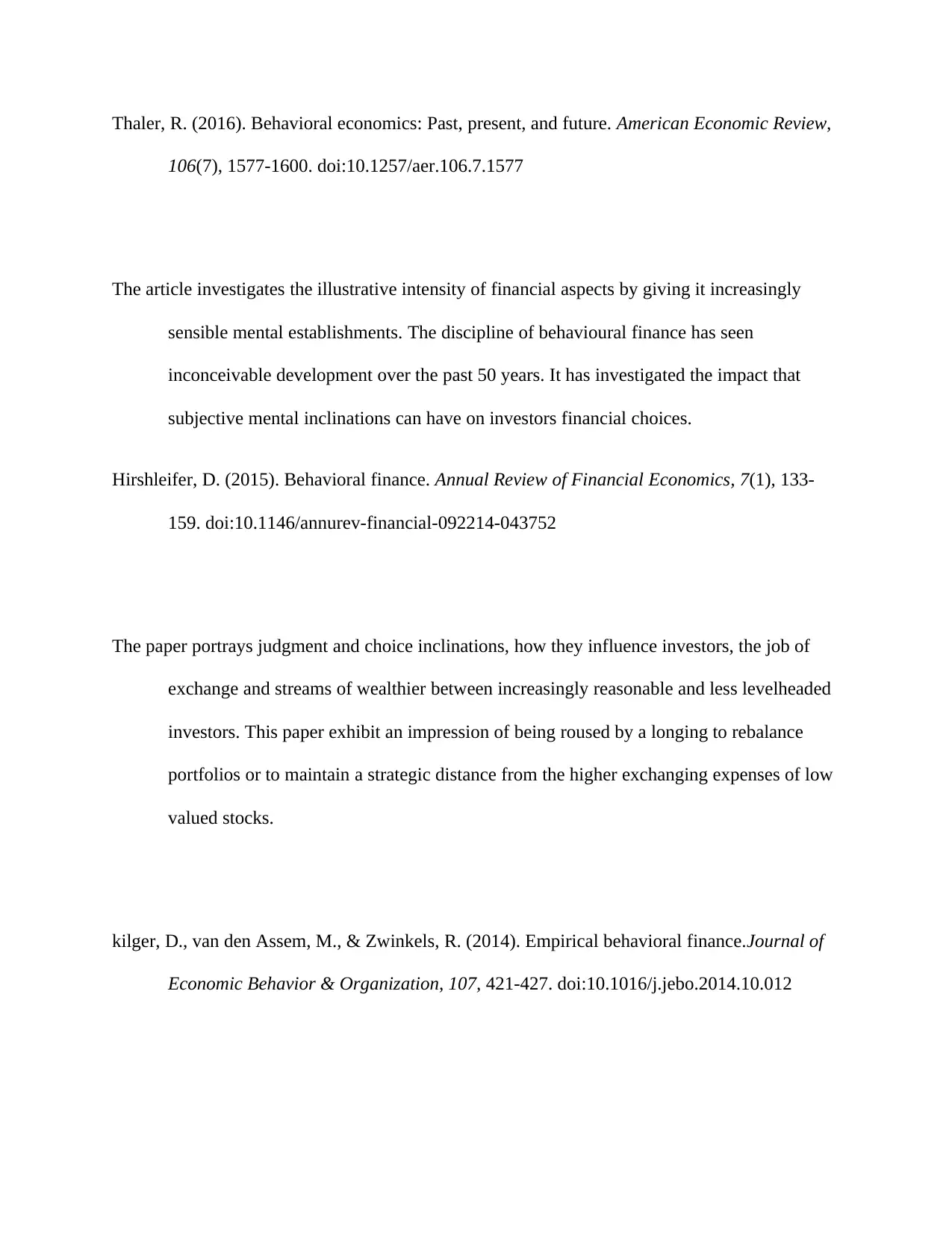
Thaler, R. (2016). Behavioral economics: Past, present, and future. American Economic Review,
106(7), 1577-1600. doi:10.1257/aer.106.7.1577
The article investigates the illustrative intensity of financial aspects by giving it increasingly
sensible mental establishments. The discipline of behavioural finance has seen
inconceivable development over the past 50 years. It has investigated the impact that
subjective mental inclinations can have on investors financial choices.
Hirshleifer, D. (2015). Behavioral finance. Annual Review of Financial Economics, 7(1), 133-
159. doi:10.1146/annurev-financial-092214-043752
The paper portrays judgment and choice inclinations, how they influence investors, the job of
exchange and streams of wealthier between increasingly reasonable and less levelheaded
investors. This paper exhibit an impression of being roused by a longing to rebalance
portfolios or to maintain a strategic distance from the higher exchanging expenses of low
valued stocks.
kilger, D., van den Assem, M., & Zwinkels, R. (2014). Empirical behavioral finance.Journal of
Economic Behavior & Organization, 107, 421-427. doi:10.1016/j.jebo.2014.10.012
106(7), 1577-1600. doi:10.1257/aer.106.7.1577
The article investigates the illustrative intensity of financial aspects by giving it increasingly
sensible mental establishments. The discipline of behavioural finance has seen
inconceivable development over the past 50 years. It has investigated the impact that
subjective mental inclinations can have on investors financial choices.
Hirshleifer, D. (2015). Behavioral finance. Annual Review of Financial Economics, 7(1), 133-
159. doi:10.1146/annurev-financial-092214-043752
The paper portrays judgment and choice inclinations, how they influence investors, the job of
exchange and streams of wealthier between increasingly reasonable and less levelheaded
investors. This paper exhibit an impression of being roused by a longing to rebalance
portfolios or to maintain a strategic distance from the higher exchanging expenses of low
valued stocks.
kilger, D., van den Assem, M., & Zwinkels, R. (2014). Empirical behavioral finance.Journal of
Economic Behavior & Organization, 107, 421-427. doi:10.1016/j.jebo.2014.10.012
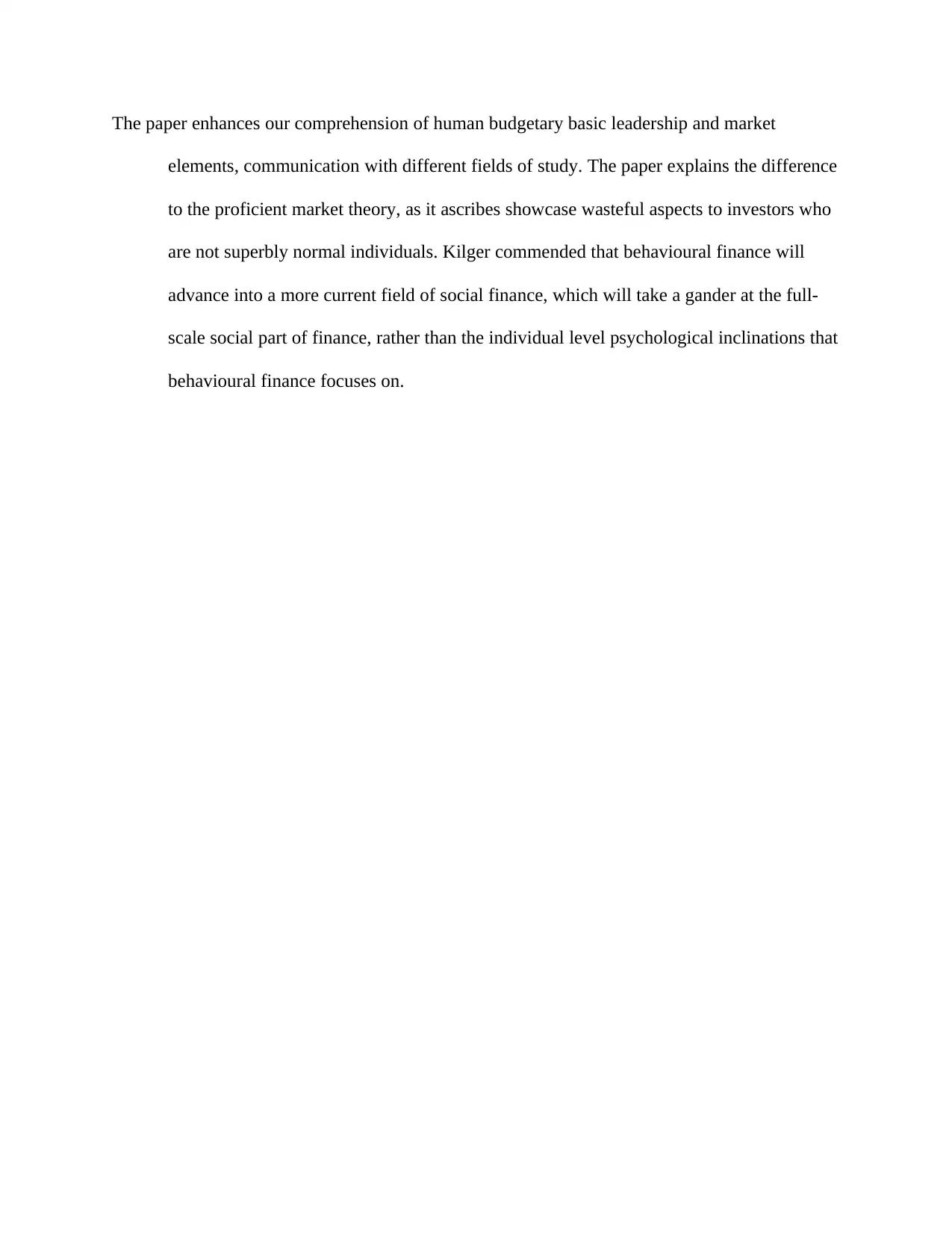
The paper enhances our comprehension of human budgetary basic leadership and market
elements, communication with different fields of study. The paper explains the difference
to the proficient market theory, as it ascribes showcase wasteful aspects to investors who
are not superbly normal individuals. Kilger commended that behavioural finance will
advance into a more current field of social finance, which will take a gander at the full-
scale social part of finance, rather than the individual level psychological inclinations that
behavioural finance focuses on.
elements, communication with different fields of study. The paper explains the difference
to the proficient market theory, as it ascribes showcase wasteful aspects to investors who
are not superbly normal individuals. Kilger commended that behavioural finance will
advance into a more current field of social finance, which will take a gander at the full-
scale social part of finance, rather than the individual level psychological inclinations that
behavioural finance focuses on.
⊘ This is a preview!⊘
Do you want full access?
Subscribe today to unlock all pages.

Trusted by 1+ million students worldwide
1 out of 6
Your All-in-One AI-Powered Toolkit for Academic Success.
+13062052269
info@desklib.com
Available 24*7 on WhatsApp / Email
![[object Object]](/_next/static/media/star-bottom.7253800d.svg)
Unlock your academic potential
Copyright © 2020–2026 A2Z Services. All Rights Reserved. Developed and managed by ZUCOL.


